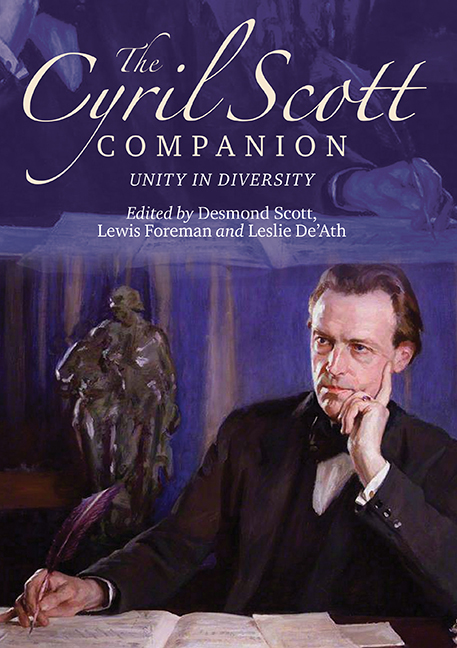Book contents
- Frontmatter
- Dedication
- Contents
- List of Illustrations
- List of Tables
- List of Contributors
- Foreword
- Preface
- Acknowledgements
- Editors' Note
- I SCOTT IN CONTEXT
- II THE MUSIC
- III THE WRITINGS
- 17 The Poetry
- 18 The Occult Writings
- 19 The Purpose of The Boy Who Saw True
- 20 Near the End of Life: Candid Confessions and Reflections: A Discussion of the Memoir
- 21 The Therapeutic Books
- 22 Childishness or The Moron Mind
- 23 A Note on the Plays
- IV PERSONAL REMINISCENCES
- APPENDICES
- CATALOGUES, DISCOGRAPHY AND BIBLIOGRAPHY
- Index of Works
- General Index
18 - The Occult Writings
from III - THE WRITINGS
Published online by Cambridge University Press: 14 September 2019
- Frontmatter
- Dedication
- Contents
- List of Illustrations
- List of Tables
- List of Contributors
- Foreword
- Preface
- Acknowledgements
- Editors' Note
- I SCOTT IN CONTEXT
- II THE MUSIC
- III THE WRITINGS
- 17 The Poetry
- 18 The Occult Writings
- 19 The Purpose of The Boy Who Saw True
- 20 Near the End of Life: Candid Confessions and Reflections: A Discussion of the Memoir
- 21 The Therapeutic Books
- 22 Childishness or The Moron Mind
- 23 A Note on the Plays
- IV PERSONAL REMINISCENCES
- APPENDICES
- CATALOGUES, DISCOGRAPHY AND BIBLIOGRAPHY
- Index of Works
- General Index
Summary
IN 1950, Cyril Scott wrote a cranky letter to Musical Opinion in which he defended himself against a critic who (in Scott's words) ‘put forward my interest in the occult as a reason for my shortcomings as a composer’. Scott complained that:
The assumption that while composing I have, so to say, one ear cocked on the occult, does not and cannot make sense. It is just one of those fables which people (especially journalists) like to create in an attempt to make a composer, artist or whatnot, appear more spectacular or unbalanced than he really is. To be quite candid, I have always and merely written the sort of music I like to write and which seems for me natural to write.
He further indicated not only that ‘I have never attempted to be a practising mystic’ but also that ‘my musical characteristics’ had developed ‘before my interest in such matters was aroused’. Such an avowal implied that his music should be judged without regard for his immensely popular occult writings, some of which are still with us today, having been continuously in print for nearly a century.
Yet, as I pointed out in my chapter on Scott's chamber music, there is indeed a connection between Scott's musical practice and his occult beliefs. They evolved in parallel and interacted with each other. But the music was also the result of an evolution that had begun, as Scott stated, before his interest in the occult developed. Thus Scott's answer to his critic should be understood to imply that there is no easy, simple, or superficial relationship between the two. The evolution of his chamber music over half a century indicates how sophisticated was Scott's development of musical analogues for mystical experiences and notions. Here we shall examine in greater detail just what those notions were.
In An Outline of Modern Occultism, Scott defined occultism as ‘the synthesis of Science, Mysticism, Philosophy, Psychology and Religion, in their purest forms’. He elaborated on this definition as follows:
It is to those who find orthodox religious creeds too illogical or sentimental, and materialism too unsatisfactory and negative, that occult philosophy should prove acceptable, for it renders life vastly more interesting, more intriguing and more romantic.
- Type
- Chapter
- Information
- The Cyril Scott CompanionUnity in Diversity, pp. 323 - 340Publisher: Boydell & BrewerPrint publication year: 2018



